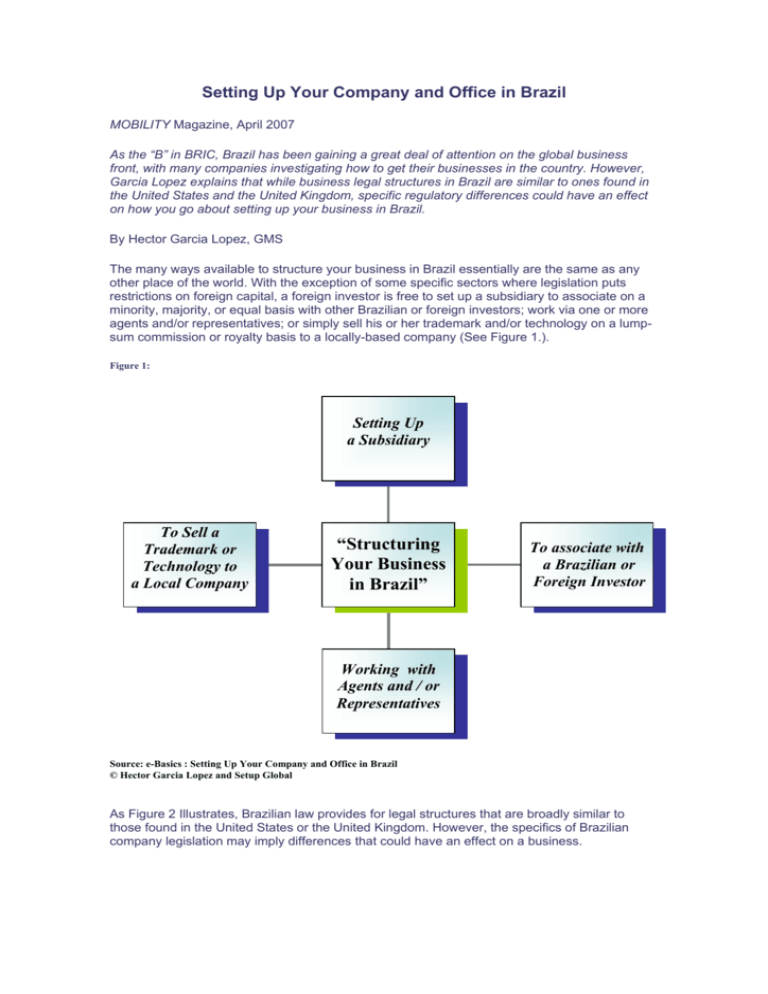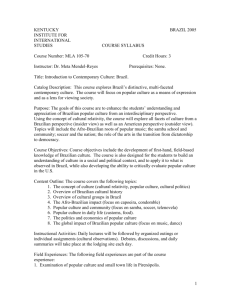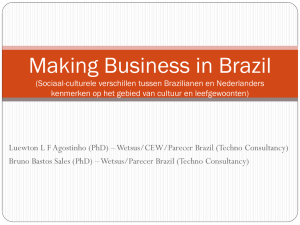
Setting Up Your Company and Office in Brazil
MOBILITY Magazine, April 2007
As the “B” in BRIC, Brazil has been gaining a great deal of attention on the global business
front, with many companies investigating how to get their businesses in the country. However,
Garcia Lopez explains that while business legal structures in Brazil are similar to ones found in
the United States and the United Kingdom, specific regulatory differences could have an effect
on how you go about setting up your business in Brazil.
By Hector Garcia Lopez, GMS
The many ways available to structure your business in Brazil essentially are the same as any
other place of the world. With the exception of some specific sectors where legislation puts
restrictions on foreign capital, a foreign investor is free to set up a subsidiary to associate on a
minority, majority, or equal basis with other Brazilian or foreign investors; work via one or more
agents and/or representatives; or simply sell his or her trademark and/or technology on a lumpsum commission or royalty basis to a locally-based company (See Figure 1.).
Figure 1:
Setting Up
a Subsidiary
To Sell a
Trademark or
Technology to
a Local Company
“Structuring
Your Business
in Brazil”
To associate with
a Brazilian or
Foreign Investor
Working with
Agents and / or
Representatives
Source: e-Basics : Setting Up Your Company and Office in Brazil
© Hector Garcia Lopez and Setup Global
As Figure 2 Illustrates, Brazilian law provides for legal structures that are broadly similar to
those found in the United States or the United Kingdom. However, the specifics of Brazilian
company legislation may imply differences that could have an effect on a business.
Figure 2 :
BRAZIL
Sociedade
Limitada
Sociedade
Anonima
USA / UK
compares
compares
Limited Liability,
Limited Partnership,
Closely Held Co’s
Corporation by
Shares
Source: e-Basics : Setting Up Your Company and Office in Brazil
© Hector Garcia Lopez and Setup Global
The Brazilian sociedade limitada can be compared with limited liability companies, limited
partnerships, and closely held companies that can be found in other geographies. The capital is
closed and there are no shares available for public sale. The liability of the partners is
proportional to their stakes in the company.
The sociedade anômina, or SA, is a share company owned by shareholders, and basically
comparable to a corporation-type of company. The capital is divided into shares that might or
might not be publicly traded. Financial statements and corporate documents must be published
periodically.
Business Structure
The very first step in moving into Brazil has to be deciding what type of structure best fits the
business. Before coming to a final decision, it is preferable to keep an open mind during market
research, establishing contacts, and becoming acquainted with local business practices and
conditions.
The first priority typically will be to make your company’s products and services available as
efficiently and profitably as possible to the clients or consumers. There are several ways to
enter the Brazilian market, including exporting, franchise development, appointing a
representative, setting up a subsidiary, and creating a joint venture. Following are discussions
of each method (See Figure 3.).
Figure 3 :
Export
to
Brazil
Appoint
a
Representative
Develop
a
Franchise
“Ways to
enter the
Market”
Set Up
a
Subsidiary
Create
a
Joint Venture
Source: e-Basics : Setting Up Your Company and Office in Brazil
© Hector Garcia Lopez and Setup Global
Exporting
A simple way to test the Brazilian market is through an export scheme with no formal
representation in the country. Many companies see this as a good first step in judging a
market’s receptiveness to one’s goods and services, with a view to subsequently build up their
presence. There are several firms that specialize in handling importation either on their own or
for clients, and the potential exporter will have several choices at hand.
Exporting has many positive aspects. It has proven to be quick and easy to set up. It requires a
minimum or no outlay beyond a few visits. It involves a minimum of commitment or
organizational disruption. It can start on a small scale and then grow with market demand.
However, it is important to remember that when exporting, an organization selling directly to
overseas consumers and/or end-users may face problems building customer relationships and
in developing new outlets. A company selling via a distributor but has no physical presence may
feel uncertain that its product is being handled properly. If the product is badly handled in the
first stages, its chances in the new market may be at risk.
Appoint a Representative
When appointing a representative, companies may opt for a single agreement with national
scope, or a number of regional agreements. A company might just seek a representative for the
bigger market of the Southeast, centered in Sao Paulo, with a view to expanding later. The
agreement is executed in a contract. It is advisable to include an option for the exporting
company to have a formal participation in the representative company at a later date.
One of the advantages of appointing a qualified representative is the higher chance of the
product having a good entry into the market. A representation agreement can provide the
exporter with a much better feeling about the potential of the product in the new market.
On the flipside, appointing a representative carries more expenses, administration, and set-up
costs than the simple export scheme. The selection of the right representative is crucial to the
business. Such relationships also may involve some direct or indirect financial support by the
exporters for participation in joint marketing.
Create a Joint Venture
The creation of a joint venture is a proven method for different types of companies to bring their
products or services to the Brazilian market. In economic and commercial terms, the joint
venture will seek to complement the existing strengths of the incoming company.
Joint ventures give the investor’s product or service the benefit of local knowledge of markets,
business practices, and the like, hence potentially increasing the speed of the launch, business
growth, and the chances of success. It also may reduce the need for capital.
However, joint ventures create potential conflicts concerning business practices, strategies,
ethics, and the like. An investor wanting to use a joint venture as a means to acquire localmarket knowledge and operating skills must ensure that such knowledge transfer really will
occur, forcing him to be committed with the local partner as a consequence.
Set up a Subsidiary
A foreign investor is allowed to set up a company in Brazil without the participation of a local
investor. Many multinationals have operated successfully in this manner for several years.
There is a good supply of local executives who can be hired to provide local knowledge from the
start, reducing the advantage of the joint venture. The positives of setting up a subsidiary
include total control, avoiding the potential conflicts of a joint venture. Also, profits accrue wholly
to the investor.
However, successful penetration in a new market requires both the knowledge of how the
market works and of the potential acceptance of the product or service to be offered.
Additionally, the potential investor needs to be advised and prepared for the possibility of failure.
Develop a Franchise
Franchising in Brazil has grown during the last several years, mainly in the fast food and retail
service sectors. United States companies with a Brazilian presence include Pizza Hut,
McDonalds, Dunkin’ Donuts, Alpha Graphics, and others. Foreign franchise companies may
choose to formalize a presence in Brazil, either via a subsidiary or a joint-venture, and use this
company to franchise to local operators. In this situation, franchising royalties will accrue to the
local subsidiary or joint venture, which may remit them as regular profits.
Deciding on the Structure that Best Fits Your Business
Foreign companies wishing to establish a presence in Brazil could adopt one of the following
legal structures (See Figure 4.):
•
•
•
the limited liability company or sociedade limitada;
the sociedade civil—a special form of limited liability company that cannot
engage in trade; or
the joint stock corporation or sociedade anônima.
Figure 4 :
Sociedade
Limitada
Business
Structures
Sociedade
Anonima
Sociedade
Civil
Source: e-Basics : Setting Up Your Company and Office in Brazil
© Hector Garcia Lopez and Setup Global
Registration of the Foreign Investment
Once the formalities for establishing a company in Brazil are complete, the foreign investor can remit the
capital to be used for its incorporation. This investment may be made in the form of a currency transfer, a
conversion of foreign credits, an importation of goods, and the like.
The rules for bringing in capital essentially are the same regardless of the type of company being
established. However, there are different procedures for the different types of capital incorporation. The
following presents an overview of these procedures (See Figure 5.).
Figure 5 :
Steps for
Company creation
completed
Investor to
remit
Capital
Source: e-Basics : Setting Up Your Company and Office in Brazil
© Hector Garcia Lopez and Setup Global
Currency
Transfer
Conversion of
Foreign Credits
Importing
goods
Cash investment. This does not require prior official authorization. Money for paying for capital or
acquisition of an equity stake in an existing Brazilian company may be sent to Brazil via any bank
authorized to deal in foreign exchange.
Conversion of foreign credits. Investments in this form are subject to the prior authorization of the
Brazilian Central Bank (Banco Central do Brasil). Once authorization has been obtained, it is necessary to
perform a symbolic exchange operation, representing the purchase and sale of foreign currency. The
company then has 30 days to incorporate the investment to its capital.
Importing goods. Investments done via the importation of goods and equipment requires prior approval
from the Central Bank or Secretariat of Foreign Trade (SECEX). The goods, machinery, and equipment
must be destined for the manufacture of products or rendering of services.
Importation of Goods—Special Note
The importation of used goods or importation under fiscal incentive can be used for capital incorporation
only if similar products are not available locally. Second-hand goods must be used in projects that promote
Brazil’s economic development. Once customs clearance has been obtained for these imported goods, the
Brazilian company has 180 days to incorporate them and then 30 days to apply for registration of the
investment.
Registration of Foreign Capital
Foreign capital must be registered at the Brazilian Central Bank, which will issue a certificate of registration
for the money invested. Investments will always be registered in the currency in which they were brought
in. Foreign capital must be registered with the Central Bank to allow the investor to make future use of the
commercial/ financial exchange market for remittance of profits, repatriation of capital, and registration of
reinvestments.
Remittance of Profits—Double Taxation Treaties
In general, Brazil places no restrictions or limits on the distribution and remittance of profits abroad.
Remittances are not subject to any withholding tax. Brazil has signed double-taxation treaties with several
countries, including Argentina, Austria, Belgium, Canada, the Czech Republic, China, Denmark, Ecuador,
Finland, France, Germany, Holland, Hungary, India, Italy, Japan, Luxembourg, Norway, the Philippines,
Portugal, Slovakia, South Korea, Spain, and Sweden.
Reinvestment of Profits
In accordance with the Foreign Capital Law, reinvestments are defined as “profits earned by companies
established in Brazil and attributed to residents overseas, which are reapplied in the same companies
which they preceded or in another sector of the domestic economy.”
If a foreign investor opts to reinvest profits, rather than remit them abroad, then these profits are subject to
new registration as additional foreign capital associated with the original investment.
Hector Garcia Lopez, GMS, is founder and managing partner of Setup Global, Sao Paulo, BRAZIL,
partner of Living In Brazil International Executive Mobility Management, Sao Paulo, and co-founder of The
Persona Place. He can be reached at +55 11 3013 2073 or e-mail hglopez@setupglobal.com.
Worldwide ERC® is the premier membership association of over 13,000 professionals who manage or service a mobile
workforce.
Copyright © 2007, The Employee Relocation Council/Worldwide ERC®. All rights reserved.
Worldwide ERC® Headquarters
1717 Pennsylvania Ave. NW, Suite 800
Washington, DC 20006
Direct +1 202 857 0857
Fax +1 202 659 8631
webmaster@erc.org
Worldwide ERC® also has offices located in Brussels, Belgium and Shanghai, China.








